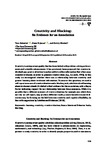Creativity and Blocking: No Evidence for an Association
| dc.contributor.author | Zaksaite, Gintare | |
| dc.contributor.author | Jones, Peter | |
| dc.contributor.author | Mitchell, Chris | |
| dc.date.accessioned | 2018-10-30T14:24:40Z | |
| dc.date.available | 2018-10-30T14:24:40Z | |
| dc.date.issued | 2017-11-21 | |
| dc.identifier.issn | 2082-6710 | |
| dc.identifier.issn | 2082-6710 | |
| dc.identifier.uri | http://hdl.handle.net/10026.1/12687 | |
| dc.description.abstract |
Creativity is an important quality that has been linked with problem solving, achievement, and scientific advancement. It has previously been proposed that creative individuals pay greater attention to and are able to utilize information that others may consider irrelevant, in order to generate creative ideas (e.g., Eysenck, 1995). In this study we investigated whether there was a relationship between creativity and greater learning about irrelevant information. To answer this question, we used a self-report measure of creative ideation and a blocking task, which involved learning about irrelevant stimuli. We failed to find evidence for this association, with a Bayes Factor indicating support for no relationship between these measures. While it is possible that a different measure of creative ideation, for example one which does not rely on self-report, may produce different results, a more lucrative research direction may be focusing on the link between creativity and cognitive flexibility, in line with suggestions by Zabelina and Robinson (2010). | |
| dc.format.extent | 135-146 | |
| dc.language.iso | en | |
| dc.publisher | The Centre for Philosophical Research | |
| dc.title | Creativity and Blocking: No Evidence for an Association | |
| dc.type | journal-article | |
| dc.type | Journal Article | |
| plymouth.issue | Special | |
| plymouth.volume | VIII | |
| plymouth.publication-status | Published online | |
| plymouth.journal | AVANT. The Journal of the Philosophical-Interdisciplinary Vanguard | |
| dc.identifier.doi | 10.26913/80s02017.0111.0013 | |
| plymouth.organisational-group | /Plymouth | |
| plymouth.organisational-group | /Plymouth/Faculty of Health | |
| plymouth.organisational-group | /Plymouth/Faculty of Health/School of Psychology | |
| plymouth.organisational-group | /Plymouth/REF 2021 Researchers by UoA | |
| plymouth.organisational-group | /Plymouth/REF 2021 Researchers by UoA/UoA04 Psychology, Psychiatry and Neuroscience | |
| plymouth.organisational-group | /Plymouth/REF 2021 Researchers by UoA/UoA04 Psychology, Psychiatry and Neuroscience/UoA04 REF peer reviewers | |
| plymouth.organisational-group | /Plymouth/Research Groups | |
| plymouth.organisational-group | /Plymouth/Research Groups/Centre for Brain, Cognition and Behaviour (CBCB) | |
| plymouth.organisational-group | /Plymouth/Research Groups/Centre for Brain, Cognition and Behaviour (CBCB)/Cognition | |
| plymouth.organisational-group | /Plymouth/Users by role | |
| plymouth.organisational-group | /Plymouth/Users by role/Academics | |
| dcterms.dateAccepted | 2017-09-26 | |
| dc.identifier.eissn | 2082-6710 | |
| dc.rights.embargoperiod | Not known | |
| rioxxterms.versionofrecord | 10.26913/80s02017.0111.0013 | |
| rioxxterms.licenseref.uri | http://www.rioxx.net/licenses/all-rights-reserved | |
| rioxxterms.licenseref.startdate | 2017-11-21 | |
| rioxxterms.type | Journal Article/Review |


